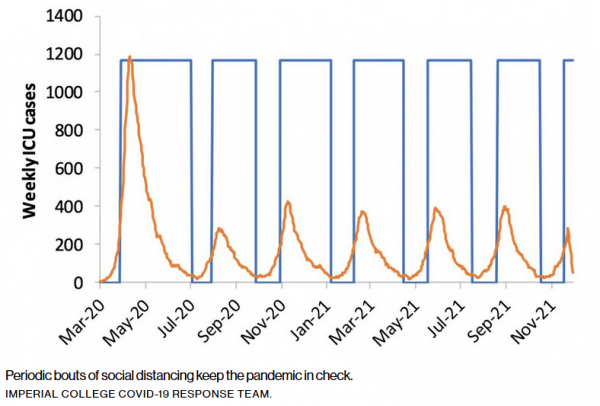Let’s start with a controversial statement: social distancing is possible for the short term, but unsustainable long term. Our species isn’t evolved to be apart for too long. We need human interaction or switches get flipped in our brains and our mental health deteriorates. Granted, there are of course fringe elements—strange stories about soldiers lost on an island for thirty years following the end of the second world war—but they’re the exception rather than the rule. For most of us isolation is bad news.
This is unfortunate, because it’s now widely agreed even by Britain, finally, that every country needs to “flatten the curve” to slow the spread of the virus so that the number of people who get sick doesn’t overwhelm the already strained health-care system to the point of collapse, as is happening in Italy right now. Even without social distancing in place, the pandemic will ramp-up, lots of people are going to get sick, and we’re going to see some deaths. Most of us will survive. The most of what we can do now is damage control, and that needs to happen on an individual level through behaviours like social distancing. The pandemic needs to last until either enough people have had COVID-19 to leave most immune, or there’s a vaccine. Both options take years.
The harsh fact is that as long as someone in the world has the virus, we’ll never be free of it and breakouts will continue until we produce controls to constrain its growth. The researchers at Imperial College London proposed a way of doing this in report. It involves more extreme social distancing measures every time the admissions to intensive care units start to spike, and relax them each time admissions fail.
Here’s a graph of what that looks like:
But we’re known for being curious and innovative creatures, and will often re-task old technologies to solve new problems. That’s why Match (MTCH.Q) (formerly match.com) is up 4.38% today in a field of red, because their dating app Plenty of Fish is responding to outbreak pressures on in-person dating by providing a free live-streaming feature.
The offering comes at the behest of a team-up with Meet Group (MEET.Q), and is intended to get singles, and folks looking for interaction, to engage in distance dating. The company is prioritizing app users in U.S. areas most hit by the coronavirus, which is right now New York, Washington and California, with availability. Next week, they plan on rolling it out to more than 80% of the United States, and globally by the end of April.
That means we can settle in for a spell, because this coronavirus issue isn’t going away anytime soon.
“Our mission is to find new ways for singles to connect while easing the pressures of dating, and right now, it’s more critical than ever. As a dating app, our business is in a unique position to innovate quickly to combat the anxiety singles may be feeling right now. I’m excited to offer this free feature to our members in the hopes it allows people to have fun and build meaningful relationships virtually, while face-to-face interaction is temporarily limited,” said Malgosia Green, CEO for Plenty of Fish.
The Plenty of Fish app comes with a “LIVE!” icon, which once tapped will allow members to practice social distancing by livestreaming with other love-seekers, and provide a unique way to stay connected and maintain a sense of community from the convenience of your tiny little slice of quarantine heaven. It also includes a dating game called NextDate, which works like speed-dating, giving streamers 90 seconds to live video chat with potential matches, and the ability to move the conversation to a more private venue.
“We have found again and again that livestreaming provides powerful feelings of connection and entertainment. In these difficult times, we are pleased to partner with Plenty of Fish to help people feel more connected,” said Geoff Cook, chief executive officer of The Meet Group.
This isn’t going to be enough for some people. There are always going to be cases of people bucking the trend and doing what they want, despite the dangers to themselves and others. That’s probably why we’ll never be quite free of this particular virus and the threat it poses, but at least we can take advantage of technology to mitigate the damage.
—Joseph Morton



